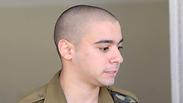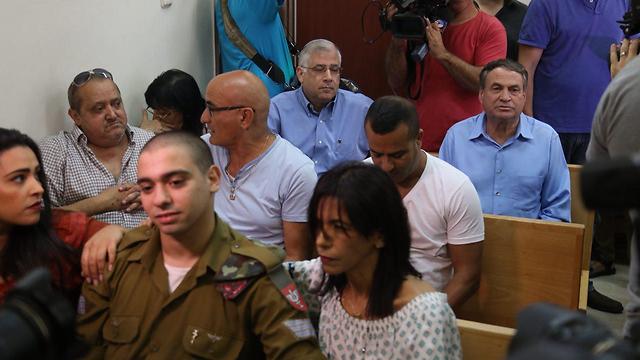

Defense in Azaria trial: He faced an impossible situation
Azaria’s defense attorneys submit final 291-page summary of the case as the judges prepare to reach a verdict; lawyers reiterate his genuine fear of an explosive vest, cite prevailing confusion at the scene, warn that a sentence could have serious repercussions on soldiers’ abilities to make decisions.
“Elor Azaria is the salt of the earth, and he could be any one of us, any one of our children, who wound up in a military incident and a pressured, dangerous and almost impossible situation,” the summary stated.
Throughout the summary his attorneys Eyal Beserglick and Ilan Katz reiterated the crux of the case put forth throughout the months-long trial. Time and again, the two emphasized that Azaria’s decision to shoot the wounded terrorist—who had stabbed Azaria's comrade just a few minutes before—in the head was on account of the fact that he sensed a real and life-threatening danger to both himself and those around him.
The attorneys cited the atmosphere of chaos at the scene, they highlight the screaming of the numerous shouts of “there could be a bomb” and reference the intelligence warnings that a Hamas terror attack combining stabbings and explosions could be imminent. Moreover, Azaria’s defense team also points to the finding of a knife next to the body of the terrorist from his view, the puffer jacket being worn by the terrorist which aroused suspicion that he was disguising a suicide vest, and the fact that the terrorist was still moving before Azaria pulled the trigger.
Addressing one of the key charges leveled against Azaria, his team flatly categorically rejected that he had ever said immediately after the incident to his company commanders that he shot the terrorists because he tried to kill his friend and therefore deserved to die.
The defense declared that even if such a statement had been made, it should be taken in the context of a man who had experienced a traumatic event and who was sleep-deprived. They added, “The claims that he said these things were not proven to the extent required for a criminal conviction. Even if the claim is accepted—a person can think that a terrorist should die—a statement such as this still does not preclude the possibility that Azaria thought there was still a danger posed by the terrorist.”
Katz and Beserglick also offered an explanation as to why the terrorist was shot in the head as opposed to anywhere else. “It was no choice but to shoot one bullet in order to ensure that he was neutralized, and not in the body since that could have resulted in an explosive belt detonating,” the defense wrote before warning that convicting Azaria could set a dangerous precedent with ramifications affecting the judgment of other IDF soldiers in the future in similar circumstances.
“It could have a profound impact on the IDF being able to give operational orders,” the summary said.
Criticism was also directed against the chief judge Col. Maya Heller. “The defense was extremely surprised when the presiding judge addressed the indicated individual in the presence of the media and those present in the courtroom and asked him several times, ‘Why are you twisting things?’ This conduct caused the defense to believe that the presiding judge is not able to judge objectively in this case.”
Earlier in the month, military prosecutor Lt. Col. Nadav Weisman submitted his final summary in the trial in which he used the words “he lied” no fewer than 23 time to describe the defendant's testimony.
This Wednesday, the defense and prosecution teams will deliver their final speeches to the case judges. A verdict is expected to be reached next month.
If Azaria is found guilty of killing the seriously wounded terrorists in Hebron in March, his sentence will be handed down approximately three weeks later.

















